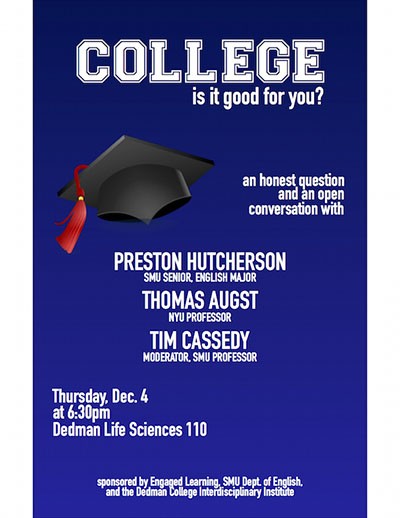
I remember vividly the end of pre-college Preston, the final hours of myself before I left for SMU. A few of my closest friends and I had been spending time together the night before move-in day. One by one they left my front yard and drove away, until I was standing alone. Before I turned to go back inside the house I remember stopping and trying very hard to make myself remember that moment—the moment before everything changed. I knew, as we all knew, that college was an unstoppable force, a four-year train that was much larger than me and destined to transform me forever. I could do nothing but climb aboard, hang on and search out the scenic view.
Each fall millions of young adults begin that same journey. At our own university some 1,400 new students will take their turn next August, just as I did three and a half years ago. These beginning points are so clear and easy to remember, but what happens next is mysterious and impossible to describe. For many students, college will be a fun four years of friendships and freedom, nothing offensive but nothing profound. When pressed, these students will default to phrases such as “life-changing” to describe their time in college and will earnestly believe they are telling the truth. I hope they are. A smaller portion of students will truly be shaken by what they learn in college, and when you ask them about it five years later they will still not know exactly what to say. They will go on to spend most of their lives investigating the questions that college first pointed them toward at age 18, giving them a rough outline and a starting point but not the finished project. Another group of students, whose exact numbers are difficult to know because we are often eager to forget them, will be devastated by college. It will break them. Some will start but never finish. Some will burn out in despair and loneliness. Some will stumble through a maze of regrettable experiences and emerge on the other side unrecognizable. Most tragically, some will remain at college forever, lending their names to memorial scholarship funds and inscriptions on plaques mounted near angel statues.
What are we to make of college then, with its myriad meanings and outcomes? And what can we know of its goodness? It is obvious that going to college is good for your economic future, but certainly the value of college is something beyond a paycheck. Is college about learning? About growing up? Is it about forming lasting relationships? How is really college good for you? How might it be bad for you? I am without answers to these questions, but I firmly believe they are worthy of our consideration. Somewhere in a combination of our most noble ideas about college and its often-messy reality lies an experience that has been hugely influential on my life and I hope yours as well. I invite you to take a few minutes of your semester and join me, along with Professor Tim Cassedy of SMU and Professor Thomas Augst of NYU, in a thoughtful conversation about what exactly college is all about, this Thursday at 6:30 p.m. in Dedman Life Sciences 110. The event is generously sponsored by Engaged Learning, the Dedman College Interdisciplinary Institute and the Department of English.








